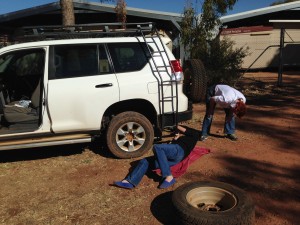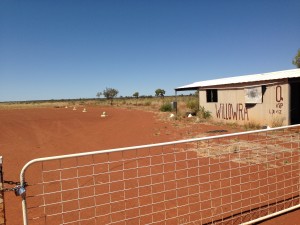WORLD VISION AUSTRALIA BOARD MEMBER’S FIELD VISIT
AUSTRALIA PROGRAM TEAM MEETING AND WARLPIRI COMMUNITY AT WILLOWRA, NT
Bishop John and Mrs Gayelene Harrower, 21-27 August 2014
Our initial contact with the members of the Australia Program occurred on the Thursday evening of their week long gathering in Alice Springs. It was an easy introduction with valuable time spent in conversation.
During Friday, plenary and small group work canvassed work issues and the challenge of building comprehensive knowledge and communications across the length and breadth of Australia: a not insignificant issue. I participated in a governance panel discussion along with staff who specialise in governance in indigenous communities: a learning opportunity for me. Clearly, the regular gathering of the Australia Program team is strategic.
The Bruderhof Community from Elsmore NSW are keen supporters of the Australia Program and four of their members attended the gathering on Thursday and Friday. Their enthusiasm for the Australia Program is palpable and grounded in prayer, presence and financial generosity. The Bruderhof Community’s partnership with World Vision is also significant for our Christian foundations and engagement with the Church.
I spoke at the Alice Springs’ Anglican Church at the Sunday Morning Worship Services and the Parish hosted an afternoon World Vision information time where Liz Mackinlay, Liz Mullen and I spoke of the work. I am proud to say that the Anglican afternoon tea demonstrated generosity in abundance! 🙂
Monday and Tuesday we spent with the Warlpiri Community at Willowra, a 4½ hour drive from Alice Springs. A key to the Early Childhood Care and Development project in which World Vision has been invited to partner, is the Reference Group of Yappa (Indigenous Women) to guide this work. The skills and advocacy capacity will then be applied to other areas of their community life. At the Early Learning Centre we observed a meeting of the Reference Group. Our experience was enlightening, to say the least, and I must say that Project Facilitator Robyn Wagner’s gifting in capacity building was exemplary.
The evening campfire gathered the community and we shared food and chatted as the children played, camp dogs wandered and the wild donkeys brayed. A special time.
Travel for hours along dirt roads is hazardous and one of our tyres had given up the struggle on the journey to Willowra. Annette Fuller, ably assisted by Liz Mackinlay, changed the damaged tyre on our vehicle .
 On Tuesday morning at the Early Learning Centre we joined about 12 children, some mothers and staff in the Playgroup. The respect and acceptance of the three WVA staff: Annette, Robyn and Liz, was evidenced by their being greeted by the Yappa with their ‘skin names’. Of course, being related has its consequences. As Liz is a ‘daughter’ to one of the women, her ‘mother’ ordered her into the kitchen to make damper! We all benefited from this ‘skin name’ relationship at morning tea! 🙂
On Tuesday morning at the Early Learning Centre we joined about 12 children, some mothers and staff in the Playgroup. The respect and acceptance of the three WVA staff: Annette, Robyn and Liz, was evidenced by their being greeted by the Yappa with their ‘skin names’. Of course, being related has its consequences. As Liz is a ‘daughter’ to one of the women, her ‘mother’ ordered her into the kitchen to make damper! We all benefited from this ‘skin name’ relationship at morning tea! 🙂
Time travelling around Willowra allowed further glimpses of community life. I mentioned one item on Facebook and Twitter: “Just heard Qantas are upgrading Q Club Lounges. I expect the Willowra Q Club is on their list. :-)” It drew some interest!
My comment sought to point to the challenges of remoteness and the necessity for capacity building in order that indigenous communities, in the pursuit of their hopes and dreams, determine the participation of stakeholders..
Upon reflection, the Warlpiri culture is so utterly different to anything we had encountered. One of the attributes that struck us was their gentleness and delightful sense of humour.
However, they have been, and continue to be, disorientated and dispirited by constant changes in Government policy and practice. We were told that each new Government throws out its predecessor’s policies and pours more millions of dollars into their own “great” new ideas and solutions. Tragically, little if any time is spent taking time to sit, wait and ask the community what are their hopes, dreams and needs. It takes a long time for trust to grow and dare I suggest that Governments like to make media headlines with their new policies and then stop 3 or 5 years later and the policies change. It is clearly a very slow process which is so foreign to the majority culture’s way.
Mistrust has tragic results: frustration, apathy, anger, withdrawal, which all makes subsequent engagements less likely to succeed.
We were very impressed with the World Vision staff who are clearly committed to patiently being with and walking beside indigenous Australians for the welfare of the children and their communities.
May this good work bring life in all its fullness to the original custodians of this vast and precious land.
Shalom,
Bishop John Harrower
30 August 2014
See also my World Vision Australia Director’s Field Visit to the Solomon Islands in 2010 to participate in the delivery of a Channels of Hope for Gender Program to reduce domestic violence. Solomon Islands: Media brief. http://imaginarydiocese.org/bishopjohn/2012/10/23/solomon-islands-media-brief/


